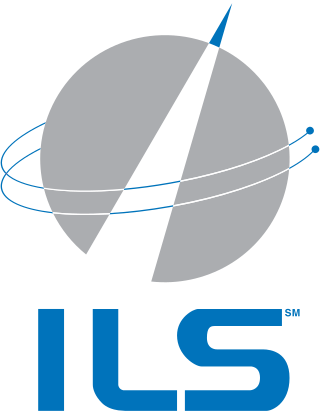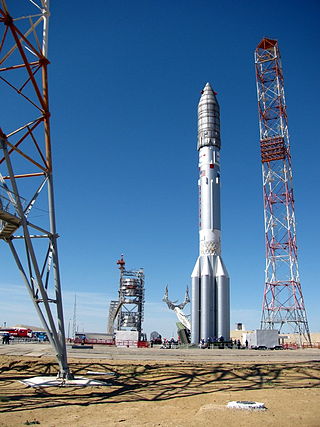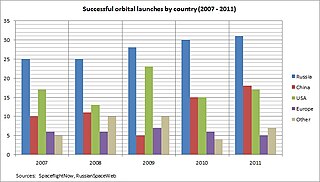Related Research Articles

Proton is an expendable launch system used for both commercial and Russian government space launches. The first Proton rocket was launched in 1965. Modern versions of the launch system are still in use as of 2023, making it one of the most successful heavy boosters in the history of spaceflight. The components of all Protons are manufactured in the Khrunichev State Research and Production Space Center factory in Moscow and Chemical Automatics Design Bureau in Voronezh, then transported to the Baikonur Cosmodrome, where they are assembled at Site 91 to form the launch vehicle. Following payload integration, the rocket is then brought to the launch pad horizontally by rail, and raised into vertical position for launch.

The State Corporation for Space Activities "Roscosmos", commonly known simply as Roscosmos, is a state corporation of the Russian Federation responsible for space flights, cosmonautics programs, and aerospace research.

Zvezda, also known as the Zvezda Service Module, is a module of the International Space Station (ISS). It was the third module launched to the station, and provided all of the station's life support systems, some of which are supplemented in the US Orbital Segment (USOS), as well as living quarters for two crew members. It is the structural and functional center of the Russian Orbital Segment (ROS), which is the Russian part of the ISS. Crew assemble here to deal with emergencies on the station.

The Angara rocket family is a family of launch vehicles being developed by the Moscow-based Khrunichev State Research and Production Space Center. The launch vehicles are to put between 3,800 kg (8,400 lb) and 24,500 kg (54,000 lb) into low Earth orbit and are intended, along with Soyuz-2 variants, to replace several existing launch vehicles.

International Launch Services, Inc. (ILS) is a joint venture with exclusive rights to the worldwide sale of commercial Angara and Proton rocket launch services. Proton launches take place at the Baikonur Cosmodrome in Kazakhstan while Angara is launched from the Plesetsk and Vostochny Cosmodrome in Russia.

Rokot, also transliterated Rockot, was a Soviet Union space launch vehicle that was capable of launching a payload of 1,950 kilograms (4,300 lb) into a 200-kilometre (120 mi) Earth orbit with 63° inclination. It was based on the UR-100N intercontinental ballistic missile (ICBM), supplied and operated by Khrunichev State Research and Production Space Center. The first launches started in the 1990s from Baikonur Cosmodrome out of a silo. Later commercial launches commenced from Plesetsk Cosmodrome using a launch ramp specially rebuilt from one for the Kosmos-3M launch vehicle. The cost of the launcher itself was about US$15 million in 1999; The contract with European Space Agency (ESA) for launching Swarm in September 2013 was worth €27.1 million.

The Khrunichev State Research and Production Space Center is a Moscow-based manufacturer of spacecraft and space-launch systems, including the Proton and Rokot rockets, and the Russian modules of Mir and the International Space Station.
KazSat-1 is the first Kazakh communications satellite. It was launched on 17 June 2006, at 22:44:05 UTC by Proton-K / Blok DM-2M launch vehicle. This satellite was constructed by Khrunichev State Research and Production Space Center for the satellite bus and Thales Alenia Space (Italy) for the payload. Thales Alenia Space is also the provider of KazSat-2 and KazSat-3 payloads.

The Briz-K, Briz-KM and Briz-M are Russian liquid-propellant rocket orbit insertion upper stages manufactured by Khrunichev State Research and Production Space Center and used on the Proton-M and Angara A5. The upper stages were also used on Rokot, one of Russia's smaller launchers, before its retirement in 2019.

The Proton-M, (Протон-М) GRAU index 8K82M or 8K82KM, is an expendable Russian heavy-lift launch vehicle derived from the Soviet-developed Proton. It is built by Khrunichev, and launched from sites 81 and 200 at the Baikonur Cosmodrome in Kazakhstan. Commercial launches are marketed by International Launch Services (ILS), and generally use Site 200/39. The first Proton-M launch occurred on 7 April 2001.
Ekspress-A2, also designated Ekspress-6A No 2 and sometimes erroneously called Ekspress-2A, is a Russian communications satellite which is operated by Russian Satellite Communications Company (RSCC). It was constructed by NPO PM and Alcatel Space and is based on the MSS-2500-GSO satellite bus.
Ekspress-A3, also designated Ekspress-3A, is a Russian communications satellite which is operated by Russian Satellite Communications Company (RSCC) and EUTELSAT.

Production Association Polyot is a Russian aerospace engineering state corporation best known for being the manufacturer of GLONASS satellites and the Kosmos-3M space launch vehicle. The company is based in Omsk, in the Russian Federation.

Russia's space industry comprises more than 100 companies and employs 250,000 people. Most of the companies are descendants of Soviet design bureaux and state production companies. The industry entered a deep crisis following the dissolution of the Soviet Union, with its fullest effect occurring in the last years of the 1990s. Funding of the space program declined by 80% and the industry lost a large part of its work force before recovery began in the early 2000s. Many companies survived by creating joint-ventures with foreign firms and marketing their products abroad.
SERVIS-2, or Space Environment Reliability Verification Integrated System 2, is a Japanese technological research satellite which was launched in 2010. It was constructed by Mitsubishi Electric, and will be operated by the Institute for Unmanned Space Experiment Free Flyer, USEF. It follows on from the SERVIS-1 spacecraft, which was launched in 2003.
Vladimir Yevgenyevich Nesterov was a Russian engineer who was the former general director of Khrunichev State Research and Production Space Center, one of the world's leading space launch providers.
The S5.98M, also known as the 14D30, is a Russian rocket engine, currently powering the Briz upper stages. It was designed by KB KhIMMASH, the famous Isaev designed bureau, and it burns UDMH and N2O4 in a gas-generator cycle.
The United Rocket and Space Corporation or URSC was a Russian joint-stock corporation formed by the Russian government in 2013 to renationalize the Russian space sector. The government intended to do so in such a way as to "preserve and enhance the Roscosmos space agency". The reorganization continued into 2014 with a Sberbank cooperation agreement, and 2015 with a process to merge with the Russian Federal Space Agency to create the Roscosmos State Corporation. Roscosmos Space Agency, as a state agency, was abolished in December 2015 and the Roscosmos state-run corporation took over 1 January 2016.
Ekspress-MD1, was a Russian geostationary communications satellite operated by Russian Satellite Communications Company (RSCC) and designed and manufactured by Khrunichev State Research and Production Space Center on the Yakhta satellite bus for RSCC's Ekspress series. It massed 1,140 kg (2,510 lb) at launch, had a power production capacity of 1300 watts with a C-band and L-band payload.
Ekspress-AM44 is a Russian domestic communications satellite. It belongs to the Russian Satellite Communications Company (RSCC) based in Moscow, Russia. To provide of communications services and to deploy satellite networks by applying Very-small-aperture terminal (VSAT) technology to Russia.
References
- ↑ "Khrunichev State Space Research and Production Space Center | Eurockot Launch Services". Archived from the original on 2017-10-20. Retrieved 2017-10-19.